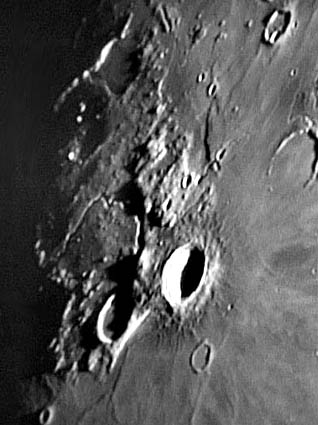Difference between revisions of "February 28, 2005"
| Line 55: | Line 55: | ||
</table> | </table> | ||
<p> </p> | <p> </p> | ||
| − | + | {{wiki/ArticleFooter}} | |
| − | |||
| − | |||
| − | |||
| − | |||
| − | |||
| − | |||
| − | |||
| − | |||
| − | |||
| − | |||
| − | |||
Revision as of 18:18, 1 February 2015
A Fractured Plateau
Image Credit: Rafael Benavides |
|
A Fractured Plateau The Aristarchus Plateau is trapezoid of mystery - an island of roughness and uniqueness in northern Oceanus Procellarum. Try to ignore the unrelated addition of gaudy Aristarchus and its wreath of ejecta that obscures the Plateau’s southeastern end. Just look at the structure of the Plateau. Just the word plateau tells you that it is a local high spot, but this fine low Sun image illustrates that its surface isn’t uniform. In front of Herodotus there is a scarp that suggests this end of the Plateau is fracture-bounded. North of Aristarchus another straight boundary marks a rectangular high area that could also be an uplifted block. At the north end of the Plateau the shadows show that there is an abrupt drop in elevation where the Plateau meets the moat of mare that separates the Plateau from the Agricola Mountains. The Plateau also appears to be slightly domed, with the high point just inside the big bend of Schroeter’s Valley. And its long shadow shows that the peak immediately east of the Cobra Head looms over the adjacent Plateau. I had previously thought of the Plateau as an area that had been uplifted uniformly like a piston. But this image shows that the Plateau was raised up differentially, with many parts shoved upward along faults, and the middle warped like a giant dome. Technical Details: Related Links: Yesterday's LPOD: One Crater’s Nomenclature Tomorrow's LPOD: A Close Approach |
|
Author & Editor: Technical Consultant: Contact Translator: A service of: |
COMMENTS?
Register, Log in, and join in the comments.




